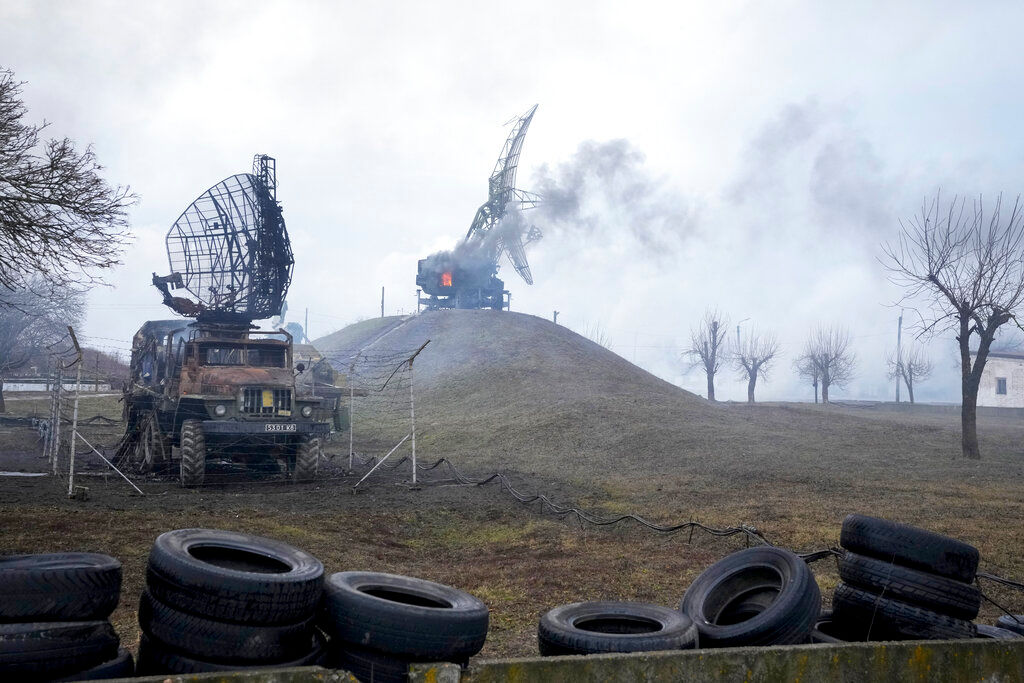Officials claimed Russian artillery destroyed more civilian buildings in another frontline city as Ukrainian authorities battled to determine the fate of hundreds of civilians who had been sheltering in a theatre smashed by a Russian airstrike in the beleaguered city of Mariupol.
Reports from inside the city stated that communications had been sporadic for days, and rescue efforts had been hampered by the prospect of near-constant shelling.
Early reports suggested many survivors had to dig themselves out of the rubble.
While the city faces intense bombardment, the mayor Vadym Boichenko, also spoke out, saying in a Telegram post, “They are blocking the supply and repair of electricity, water and heat. They have also damaged the railways. They have destroyed bridges and smashed trains so that we can’t evacuate women, children and the elderly out of Mariupol”.
Also Read | Wanted! Russian businessman puts $1 million bounty on Vladimir Putin’s head
Meanwhile, a spokesperson of the Ukrainian National Guard told CNN that they do not intend to give up the city, saying, “The Ukrainian military is not going to surrender the city and will strike at the occupying forces. The military will also continue to destroy enemy sabotage groups on the outskirts of Mariupol”.
Despite the best efforts, Russian forces have continued shelling “even in the direction of residential buildings, schools and kindergartens” as per this spokesperson and after 26 hours, the situation is critical.
Russian forces have already captured Kherson and Mariupol looks to be the next city that might fall. If it does, it would be a significant moment in the Russian invasion of Ukraine. Here’s why.
A strategic and symbolic victory
Mariupol is located on the Azov Sea, around 100 kilometres away from Donetsk, which Russian President Vladimir Putin has now recognized as independent.
If captured, this city would become a key element in the potential land passageway between Russia and the Crimean peninsula. Notably, Russia annexed Crimea from Ukraine in March 2014.
Also Read | Kyiv shrines, memorials with powerful symbolic value at risk
This ties in with the Russian idea of territorial continuity, in which it plans to link the Black Sea peninsula and the separatist regions to Ukraine’s east, Donetsk and Luhansk, that Moscow now considers independent.
However, losing Mariupol isn’t just losing a city, it is losing access to the Azov Sea “in an economic sense” as per Radio Free Europe/Radio Liberty.
The fight for Azov Sea
While controlling Mariupol would grant Russia greater access to the Azov Sea, it actually already controls the sea in practice. By constructing the bridge spanning the Kerch Strait in 2018, to physically link the Crimean Peninsula to Russia, it has encircled the Azov Sea and cemented control of the only entry point.
If Russia already controls the entry point, vis a vis, the Kerch Strait, then why does it need to control Mariupol and the Azov Sea?
Also Read | Russian forces gather at Kyiv’s gates, will the Ukrainian capital fall?
A political analyst for the Dialogue of Civilizations Research Institute told France 24, the state-owned French news network, “These are symbols. Everything that happens now has a symbolic meaning. There is less and less of a rationale. The objective is to show that Russia is a great power. Ukraine is the last place where it is possible to demonstrate that”.
If Russia does gain control of the Azov Sea it’ll cease to be accountable to anyone, and could place nuclear submarines there too, as per the analyst.
Also Read | First batch of 16,000 foreign fighters arrive in Ukraine to fight Russia
Currently, the tensions around the Azov Sea is hurting the economies of both Russia and Ukraine. France 24 also reported Russian naval authorities saying that over 40 ships are waiting to enter the Azov Sea. If Mariupol should fall, the port would serve as an additional logistical lifeline to Russian troops in Ukraine. It would also help Russian ships resume navigation which is currently suspended due to “the implementation of anti-terrorist measures in the waters of the Azov Sea”, as per Russian naval authorities, as reported by France 24.







